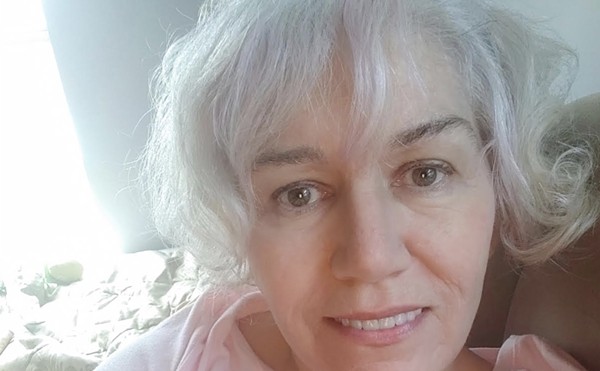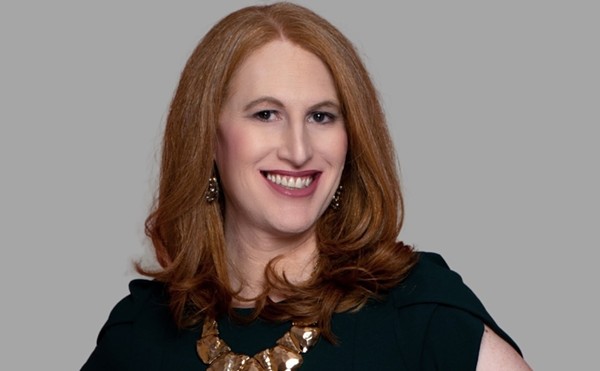This wasn't the first time medication hadn't worked as promised. At age 23, not long after arriving home, Belen went to the VA. He says the doctor put him on a combination of antidepressants and Ambien, which made him sleepwalk, so he nixed that soon after and went about his life.
These pills, those pills – for about five years, the cycle continued. Belen says he battled mostly in silence and often kept a pistol within reach, just in case he ever finally had the urge to pull the trigger.
"You play the game," Belen says. "Unfortunately, it's an invisible wound, PTSD, so you can't stick it, you can't perform surgery on it to heal it. All you have are these medications, and it's trial and error. You start feeling like a guinea pig. You start realizing that pretty much for the rest of your life this is your option, being a zombie all day, the suicidal ideation increases, all that stuff."
By 2016, the triggers and suicidal thoughts had continued to escalate. In his job as a salesman with a major insurance company, he was given a work-from-home position. But that only allowed Belen to isolate himself from the public, which was counterproductive.
Belen began self-medicating by starting his day off with a few gulps of Fireball whiskey. He had to hide his drinking from Danielle; he'd start as soon as she'd leave for work in the morning. At night, Belen remembers lying in bed beside his wife – they married in 2014 – and infant daughter, thinking to himself that he should grab the pistol he kept under the mattress: Just blow your brains out right now. Just do it.
If the right elements on the right day came together, Belen says, it would have happened. He knew he had to tell Danielle, so he did. She took his gun. They went to the VA.
This time, he tried to convince himself that the pills were working. But Danielle knew better. His temper continued to flare. The situation came to a head on an early Sunday morning in the driveway of their home, when Danielle awoke to find her husband's brother and a friend dragging an already-drunk Belen into their car to keep him away from the house.
He was going through another episode: This time, as he gazed at his Army service uniform hanging in the garage, he had convinced himself that that day, Oct. 23, was the day he would finally kill himself. Belen started grilling steaks on the front lawn at 6 a.m. while he waited to watch the Los Angeles Rams and New York Giants face off in an early-morning game in London, the whole time drinking Fireball and texting his brother that he was going to end his life.
Afterward, a VA doctor told Belen that he had been given the wrong medication and it was like "throwing gasoline on a fire." So Belen decided that enough was enough. He toned down his drinking, quit the pills cold turkey and resorted solely to weight lifting and using cannabis. Since coming home from duty, he had used marijuana intermittently, though drug tests at his work kept him from using it regularly.
What no one told Belen was just how bad the physical withdrawals would be once he kicked the pharmaceuticals. He discovered that one afternoon while at the gym when he was overcome with nausea. After dragging his vomit-covered self home, he sent his daughter inside with Danielle's son: "Take your sister and lock yourself into your room. I'm extremely sick," Belen told him.
Once inside, Belen ran into his daughter's room and grabbed the rosary beads hanging above her crib. Down to his underwear and dry-heaving himself into exhaustion, Belen was crying and sweating bullets. He fell to the floor. He curled into a ball and tried to rock himself to sleep, squeezing the rosary beads until his knuckles were white. He prayed until he passed out on the soft living room carpet.
Nick Etten, founder and executive director of the Veterans for Cannabis Project, argues that all federal studies on medical cannabis are set up to fail because there's only one facility in the country – at the University of Mississippi – that's licensed for use in Food and Drug Administration-approved research.
"It's how they obstruct beneficial research," Etten says. "There's a lot of demand for product that can be used in FDA-approved research, but there's no supply because there's only the University of Mississippi and nobody wants to touch that."
Etten says that many growers and researchers believe the facility is less than subpar. In 2016, the DEA relaxed its rules enough to let other institutions apply to be cannabis-research facilities. However, none of those applications have been approved.
Veterans overwhelmingly support the study of medical cannabis for treatment. According to a November study conducted by the American Legion, 92 percent of veterans and caregivers support medical research on cannabis, while 82 percent of respondents support outright legalization of medical cannabis. The survey also found that 22 percent of veteran household respondents already use cannabis to treat a medical condition.
"Overall, I think this is indicative of the times," Bryant says. "We're seeing more and more discussion on how medical cannabis can help those who are suffering from chronic pain and from injuries."
Traditionally, that same chronic pain might have been treated with opioids. But because of the national epidemic, some have opted to use cannabis instead.
About 60 percent of all veterans returning from the Middle East suffer from some sort of chronic pain, according to VA research. Moreover, a 2014 study by the VA found that 15 percent of veterans regularly use opioids, and a 2011 study found that veterans were twice as likely to die from an opioid overdose compared to the rest of the population.
In addition, a recent study by the National Academy of Sciences, Engineering and Medicine found that states that offer doctors the ability to prescribe marijuana have 14 percent fewer opioid prescriptions. The researchers estimate that medical cannabis dispensaries reduced the number of opioid prescriptions by 3.7 million daily doses. The takeaway: Fewer opioids means fewer opioid addictions and overdoses for both veterans and everyone else.
If not for the severity of his condition, Belen wouldn't have used cannabis for treatment. If not for cannabis, he would have never found his way to the Southeast Cannabis Conference in Fort Lauderdale in June 2017. If not for the conference, he would never have met Montel Williams – the daytime TV host, who's a combat veteran as well – who pulled him onstage for Belen's first large public speaking opportunity. If not for meeting Williams, he would have never been hooked up with retired NFL player Marvin Williams, who convinced Belen to join the federal lawsuit.
The lawsuit, however, was dismissed by U.S. District Court Judge Alvin Hellerstein on Feb. 26, on the grounds that the plaintiffs ought to first pursue "administrative remedies," which could take as long as nine years, and that cannabis' medical value is something for the attorney general to consider, not a federal court. The judge took pains to note that "this decision should not be understood as a factual finding that marijuana lacks any medical use in the [U.S.]."
The plaintiffs are appealing to the U.S. Court of Appeals for the Second Circuit.
Regardless of what happens, this is the beginning, rather than the end, of the Belens' ride.
Jose and Danielle both resigned from their jobs, where he had been making upward of six figures a year, and launched an organization called Mission Zero, designed to help bring national awareness to veterans who are dealing with PTSD.
It hasn't been easy. The Belens were forced to give up their home and move in with Jose's mother. With less money in their pockets, they've found themselves in lines at Salvation Army for food.
"When you dedicate yourself to others, there is no clear path," Belen says.
Within eight months of using cannabis as his source of treatment, Belen says the difference in his everyday life is night and day. He wants to show more veterans the difference pot can make in their lives, too. It's become his mission.
The recurring nightmares, the outbursts, the mood swings – all that goes hand-in-hand with post-traumatic stress. It hasn't gone away, he says, but he's coping with his condition instead of feeling like the walking dead.
He cried leaving Iraq and he cried leaving Afghanistan. He had assimilated to the lifestyle that comes with fighting in a war. But over the last year, he's finally begun to assimilate to his life outside of the war, more than 13 years later.
Belen feels at peace. "What do you do when you come home and you've prayed for war every second you're out there, and prayed to be in a situation where you can either take the enemy's life or he can take your life?" he asks himself.
He pauses.
"You see shit, you're a part of shit, and there are demons you take home with you. It's part of the sacrifice," he says. "This isn't a fucking sob story for me. You're conditioned mentally to never break – the warrior spirit goes within you."
Belen is years removed from the war, but the war will never be removed from him.


















